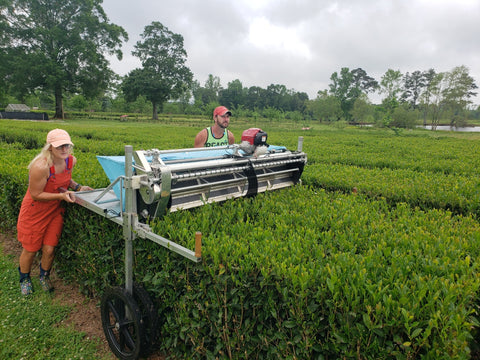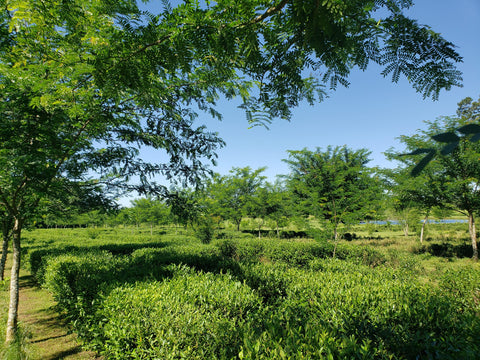Tea was discovered initially in China in 2737 BC. It wasn't until much later that the Dutch introduced tea to the United States in the late 1640's. It took off with the upper class market in the US at that time.
As of 2019, according to the Tea Association of America, America consumes over 84 billion servings of tea, or more than 3.8 billion gallons. About 84% of all tea consumed was black tea, 15% was green tea, and the small remaining amount was oolong, white and dark tea. About 75% of the tea consumed is cold.
It is estimated that 260 million pounds of tea was imported into the US according to stats in 2018. But today, small tea companies are popping up to change that and bring tea closer to home.
Who was the first tea company in the USA?
The first successful tea farm was started in 1772 near Savannah. But it was Junius Smith who grew tea successfully commercially in Greenville, South Carolina in 1848. In 1884 the US government experimented with tea growing in South Carolina and determined the environment was too unstable for tea growing.
One of the first major issues of tea growing was that the US could not compete with the cost to harvest. This remains an issue today. Places like China and India benefit from cheap labor and little to no regulations on work conditions to harvest millions of pounds of tea each year.
This also was likely a factor in the demise of the tea industry in Hawaii in 1892. It had a short-lived tea industry starting in 1882.
US tea farms in 2023 are now using technology to overcome the labor cost by using harvester equipment. But labor is still required so tea farms continue to have operational costs.

Harvesting equipment in the US in 2023. Initially, tea would only be hand picked, resulting in higher costs for tea companies in the USA.
The first tea bag was founded in America.
The first tea bag intended for easier tea preparation was patented in 1903 in Milwaukee. But it was actually thought that Thomas Sullivan of New York is the true founder of the tea bag, by accident. Thomas was a tea and coffee importer and started shipping his tea in silk bags.
The 60's brought on tea import fears.
A concern that instability in imports encouraged the development of the Lipton Tea Farm in the USA. Founded by Glasgow grocery store owner Sir Thomas. Sir Thomas strived to open up tea outside of the upper class market to make it more open to all people. A fan of entertaining he knew how to market tea. He would look for ways to make packaging less expensive and set up a factory in Hoboken, New Jersey.
The Lipton tea company paid to move surviving tea plants to Wadmalaw Island. Where the farm would eventually be sold just over 20 years later to become what many know as the Charleston Tea Plantation.

Jason stands in front of a tea plant located at his tea farm in Mississippi that is believed to be 100 years old and transplanted from the Lipton Tea farm originally.
The official tea of the United State Whitehouse.
Charleston Tea Plantation would eventually become the official supplier of tea to the United States White house.
The Tea industry has had a hard time thriving in the US.
Declining demand for sugar in the US and the discovery of a tea plant strain that flourished in Hawaii's growing conditions, made for a good replacement crop from sugar farms to tea farms. This would include adventures by The Great Mississippi Tea Company owners Jason and Timmy.
After winning an award at Totus, Jason and Timmy were approached to partner with Griff Frost, the Akatsuka Orchid Company and Eric Sweely to start a tea co-op in Hawaii. The group rented a property that belonged to Hilo Coffee Mill where they had rehabbed some plants and planted more.

Jason in Hawaii in 2015.
Unfortunately, with the eruption of the volcano in Hawaii then followed by Covid it all fell apart. The eruption impacted tourism which was the main buying market in Hawaii for the tea.
Today, in Hawaii there are very few growers, mostly backyard farmers.
The Charleston Tea Plantation would also face their own challenges with a Bankruptcy in 2003. This would lead to a buy out by the American tea company Bigelow Inc. Where they turned the plantation into a tourist destination to revive its profits and keep the plantation going.
Tea in the USA in 2023
In 2023 tea in the USA is still very small. With The Great Mississippi Tea Company growing into one of the largest active tea farms in the United States. Currently we have 40,000 tea plants on the farm.

The Great Mississippi Tea Farm in Brookhaven, Mississippi.
Charleston Tea Plantation remains a tourist attraction under Bigelow Inc ownership.
And other small farms continue to operate and aspire to grow into major tea producers in the US such as Long Leaf Tea also in Mississippi and Fleur De Lis Tea in Louisiana.
The future of tea in America.
The future of tea in America looks bright but not without its challenges. Prices of American tea will continue to be higher than imports as producers face higher technology costs and higher labor costs. But with innovation, science and determination farmers like Jason and Timmy are pushing ahead with gusto and breaking norms.
Their mission has always been about bringing tea closer to Americans. Offering tea made with US food safety standards, with fair labor practices and sustainably. With their continued determination we are confident that you will continue to see The Great Mississippi Tea company grow and develop and perhaps one day be the United States #1 producer of tea in America.
A bold goal. But if anyone can do it, it will be Jason and Timmy, they are the tea pioneers of this century.
Want to keep learning about tea? keep reading from our blog.
How Black tea is made in the USA.






Very glad you mentioned the labor costs. Many people are cost-conscious, we really all should be, about things we buy but often times don’t realize that higher prices could also ultimately mean a better life for the farmers. So thank you guys for what you are doing. Keep up the hard work!
Leave a comment